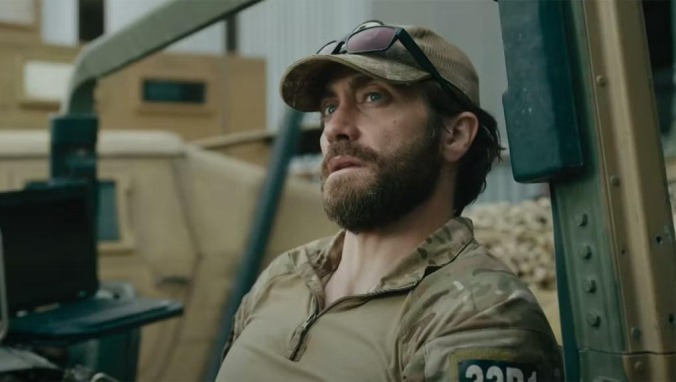Guy Ritchie’s The Covenant review: Jake Gyllenhaal can't rescue this Afghan war drama
Guy Ritchie bids for respectability, but fails to offer any new insights into an unpopular war or those who fought it

Guy Ritchie’s The Covenant might have its director’s name in the title, but it’s star Jake Gyllenhaal who evokes what the film is trying to be. It’s an action movie set during an unpopular war that becomes a survival story before finally morphing into a rescue-and-escape caper. Think of it as Gyllenhaal’s take on Rambo: First Blood Part II (1985) or The Revenant (2015) while trying very hard to be his American Sniper (2014). All three movies delivered boffo box office and acclaim for their respective stars; Sylvester Stallone, Leonardo DiCaprio, and Bradley Cooper. It’s a tried and true Hollywood tradition to try and replicate what worked before, and to emulate successful stars’ careers, but it’s doubtful Guy Ritchie’s The Covenant will do much for Gyllenhaal’s career.
He plays John Kinley, an army sergeant leading a small group of soldiers in a quest to locate explosive landmines 17 years into America’s war in Afghanistan. The story starts with an ambush that kills one of Kinley’s soldiers and their Afghan interpreter. The replacement interpreter is quickly introduced as the savvy and resourceful Ahmed (Danish actor Dar Salim of TV’s Borgen). The relationship between Kinley and Ahmed then moves to the center of the film. Kinley’s interactions with the other soldiers in the battalion are full of wisecracking innuendos and immodest bravado, reminiscent of the dialogue in Ritchie’s other, far less serious movies. His relationship with Ahmed is different, molded in the classic cinematic milieu of bro friendship. They start as taciturn and begrudgingly trustful then gradually become a full-fledged brotherhood ready to sacrifice their life for each other.
Unfortunately both characters are sketched only in the broadest terms. Kinley is the everyman American soldier; righteous, brave, in command, and respected by his fellow soldiers. Ahmed is his everyman Afghan helper. Kinley’s reasons for enlisting are never explained and Ahmed—who doesn’t even get a last name—is only afforded the simplistic explanation of trying to save his family. While that might be a compelling reason, the character doesn’t get much interaction with said family. There’s nothing deeper than that, all of it rather impersonal.
The script, credited to Guy Ritchie and the team of Ivan Atkinson and Marn Davies, has no take whatsoever on the war itself. The scope of what is covered is very narrow, just a few soldiers at the beginning, then dwindling to just the two lead characters. The audience gets no insight on what any of them think about the war or its morality. They seem to be only concerned with the tasks at hand. Words like “traitor” are bandied about, with no nuance given to the complexity of the situation.
The part of the film that most feels like Ritchie’s other movies involves the mission. A group of men come together to do something. Instead of the usual spies or small-time criminals, it’s soldiers in Afghanistan. But the relationships and the attitudes are part and parcel of Ritchie’s other movies. Then Guy Ritchie’s The Covenant veers into a survival story as two men try to outmaneuver the Taliban in the mountains of Afghanistan. And finally we get the rescue and escape mission. Not one of these is compelling on its own and all feel like the bare minimum of what they could be in story and character. This film is even free of any clever action sequences, as if in trying to tell a serious story Ritchie forgot what makes his films special. Strangely devoid of any tension, the action is merely machine guns and explosives. There’s no finesse to how the scenes are shot and more damningly, when a complication is introduced it’s quickly resolved and onto the next one it goes.
Afghan interpreters were promised relocation and immigration status to the U.S. for their contributions to the war, an interesting historical nugget that could have provided the film with some narrative oomph. Instead, the bureaucratic process of procuring this visa quickly dissolves into a showcase of Gyllenhaal yelling into a phone and playing drunk, while the audience is never shown how Ahmed is dealing with the situation.
Throughout all this, Gyllenhaal is appropriately tightly wound. Yet the character does not afford him much complexity to work with. Salim fares better, adding a much needed gravitas and calm to the jittery proceedings. He has a natural command of the frame even when his character is saying nothing. Emily Beecham, as Kinley’s wife, is saddled with one of the worst written “supportive wives” roles in recent memory. In attempting to give the character something more to do, the screenwriters come up with two laughably written scenes. You see, this wife is also a successful businesswoman. So Beecham gets to tell Gyllenhaal not once but twice that she’s competent at running the business the Kinleys apparently own. Then she’s back to supporting him and looking concerned.
Guy Ritchie’s The Covenant offers marginal entertainment value. It’s a film that seems afraid to offer any ideas about its setting and characters beyond the minimum. Only Salim, in a performance of quiet strength, gives the audience something to latch onto. However, at face value, if one were to ignore character and story and only revel in the endless machine gun fire, maybe there’s a few minutes of something to watch.
Guy Ritchie’s The Covenant opens Friday, April 21, 2023